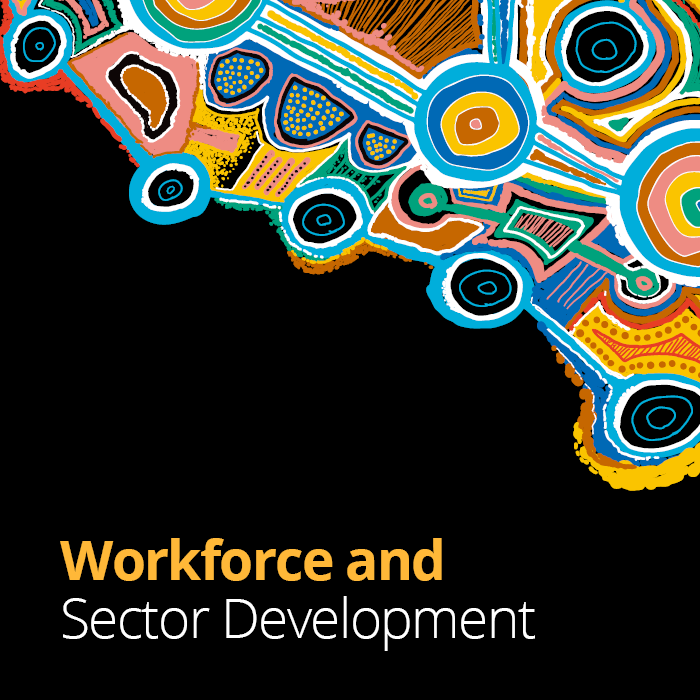The Workforce and Sector Development Work Group consist of a number of programs that work closely with the AHCWA Member Services, government and non-government organisations, as well as our National peak body, the National Aboriginal Community Controlled Health Organisation.
The programs provide advocacy, leadership, guidance and facilitate forums to support the sector. Many of the programs also strive to build the workforce and health capacity of Aboriginal and non-Aboriginal people through various training courses, both accredited and non-accredited through the AHCWA Registered Training Organisation – the Training and Development Centre.
AHCWA facilitates the following Workforce and Sector Development programs:
AHCWA acknowledges that social and emotional wellbeing is a significant contributor to the prevention of suicide deaths amongst Aboriginal people. By building the capacity of Aboriginal communities and those working with them across Western Australia, AHCWA works to address the physical, mental, emotional, and spiritual issues that impact on individual wellbeing.
To support the Western Australian Suicide Prevention Framework 2021-2025, which aims to guide suicide prevention activity in Western Australia; AHCWA receives funding from the Mental Health Commission for the delivery of the culturally adapted Certificate II in Family Wellbeing.
AHCWA is currently working closely with the Batchelor Institute in the Northern Territory to reaccredit this course with the Australian Skills Quality Authority.
Find out more about AHCWA’s Family and Wellbeing Program here.
Aboriginal and Torres Strait Islander people have shown remarkable resilience in the face of the ongoing impacts of colonisation, racism, discrimination, and intergenerational trauma. Although considerable health gains have been achieved, there are some conditions that exclusively or disproportionately impact Aboriginal and Torres Strait Islander people.
Otitis media, the fourth most commonly managed condition in Australian primary health care, is one such condition. On average, around one in three Aboriginal and Torres Strait Islander children experience early onset, chronic otitis media.
Ear disease in Aboriginal and Torres Strait Islander children is often associated with remoteness. However, children in urban areas also experience middle ear infection and hearing loss at high rates.
Funded by the National Aboriginal Community Controlled Health Organisation, the Ear Health Coordination Program supports health services to deliver ear and hearing health activities in their jurisdiction, and outlines performance expectations in relation to this funding.
The program aims to:
- improve Aboriginal and Torres Strait Islander ear and hearing health;
- enhance the monitoring and treatment of ear and hearing health in primary care;
- have a particular focus on supporting access to quality, culturally safe ear and hearing health services for Aboriginal and Torres Strait Islander children and youth; and
- work collaboratively with primary health care clinics and other stakeholders to identify and support activity needed to improve ear health.
AHCWA coordinates and delivers activities that support the Aboriginal and Torres Strait Islander ear and hearing health workforce within organisations, build the community-controlled workforce capacity and contribute to improved awareness within the mainstream health sector about culturally competent responses to ear and hearing health.
The Ear Health Team works closely with Rural Health West, Hearing Australia, the National Aboriginal Community Controlled Health Organisation and state affiliates. They facilitate the WA ACCHS Ear Health Forum, which meets quarterly to discuss key ear health issues, receive updates and discuss key topics from a state and national perspective from MBS items to the ECCHS changes.
Find out more about AHCWA’s Ear Health Training here.
Increasingly, Aboriginal Community Controlled Health Services across Western Australia are becoming registered providers of the NDIS to support the delivery of disability services that are responsive to the unique needs of Aboriginal people.
AHCWA now supports WA ACCHS to engage with the National Disability Insurance Agency, as well as to establish sustainable, contemporary NDIS business solutions, ensuring they are viable and efficient NDIS service providers into the future.
Find out more about the NDIS here.
AHCWA, in partnership with the Health Consumers’ Council and the National Justice Project, has developed training to help support Aboriginal people who are dealing with the health system. The inequity and injustice that can confront Aboriginal people in our health system can lead to poorer health outcomes for this community, and health advocacy plays a big part in addressing these issues.
AHCWA’s Aboriginal Disability Advocacy Training program helps people gain a better understanding of the barriers and enablers for Aboriginal people within our health services and systems, a deeper understanding of health rights and the important role of health advocacy.
The training focuses on:
- Increasing understanding about the barriers that can prevent Aboriginal people accessing equitable care.
- The development of a better understanding of the health system.
- Nurturing a deeper understanding of health rights.
- Developing participants health advocacy skills so they can better support Aboriginal clients
- Highlighting the various complaints mechanisms and avenues for people
- Self-care and vicarious trauma
To register your interest for future sessions, please contact Tania Harris, Aboriginal Engagement Coordinator, on [email protected] or 9221 3422.


